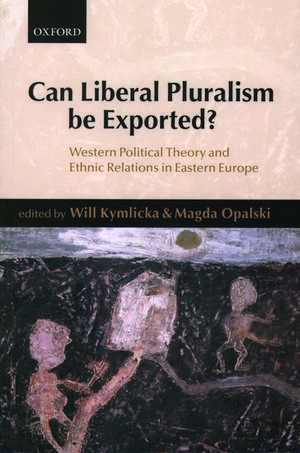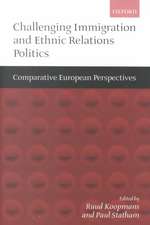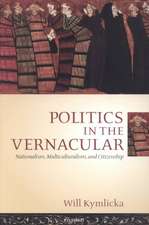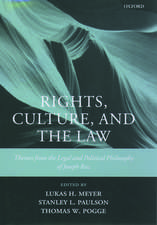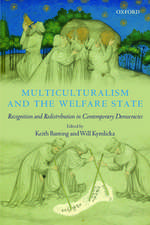Can Liberal Pluralism be Exported?: Western Political Theory and Ethnic Relations in Eastern Europe
Editat de Will Kymlicka, Magda Opalskien Limba Engleză Paperback – 16 ian 2002
| Toate formatele și edițiile | Preț | Express |
|---|---|---|
| Paperback (1) | 331.45 lei 31-37 zile | |
| OUP OXFORD – 16 ian 2002 | 331.45 lei 31-37 zile | |
| Hardback (1) | 852.15 lei 31-37 zile | |
| OUP OXFORD – 17 ian 2002 | 852.15 lei 31-37 zile |
Preț: 331.45 lei
Preț vechi: 404.08 lei
-18% Nou
Puncte Express: 497
Preț estimativ în valută:
63.43€ • 65.98$ • 52.37£
63.43€ • 65.98$ • 52.37£
Carte tipărită la comandă
Livrare economică 04-10 aprilie
Preluare comenzi: 021 569.72.76
Specificații
ISBN-13: 9780199248155
ISBN-10: 019924815X
Pagini: 458
Dimensiuni: 156 x 235 x 25 mm
Greutate: 0.66 kg
Ediția:New.
Editura: OUP OXFORD
Colecția OUP Oxford
Locul publicării:Oxford, United Kingdom
ISBN-10: 019924815X
Pagini: 458
Dimensiuni: 156 x 235 x 25 mm
Greutate: 0.66 kg
Ediția:New.
Editura: OUP OXFORD
Colecția OUP Oxford
Locul publicării:Oxford, United Kingdom
Recenzii
An important and very interesting volume on a topic of great contemporary significance ... This is a very successful volume ... The book as a whole is an exciting venture in the field of applying normative ideas to an often refractory and complex social reality.
The best reflection and most comprehensive and authoritative summary of the debate on the universality of the western conception of ethnocultural justice.
The quality of the commentaries on Kymlicka's introductory chapter and his own concluding response ensure that the volume overall fulfils its purpose of critically examining the applicability of western political theory to the ethnopolitics of Central and Eastern Europe. The mix of contributors allows for a balanced debate of Kymlicka's views.
The best reflection and most comprehensive and authoritative summary of the debate on the universality of the western conception of ethnocultural justice.
The quality of the commentaries on Kymlicka's introductory chapter and his own concluding response ensure that the volume overall fulfils its purpose of critically examining the applicability of western political theory to the ethnopolitics of Central and Eastern Europe. The mix of contributors allows for a balanced debate of Kymlicka's views.
